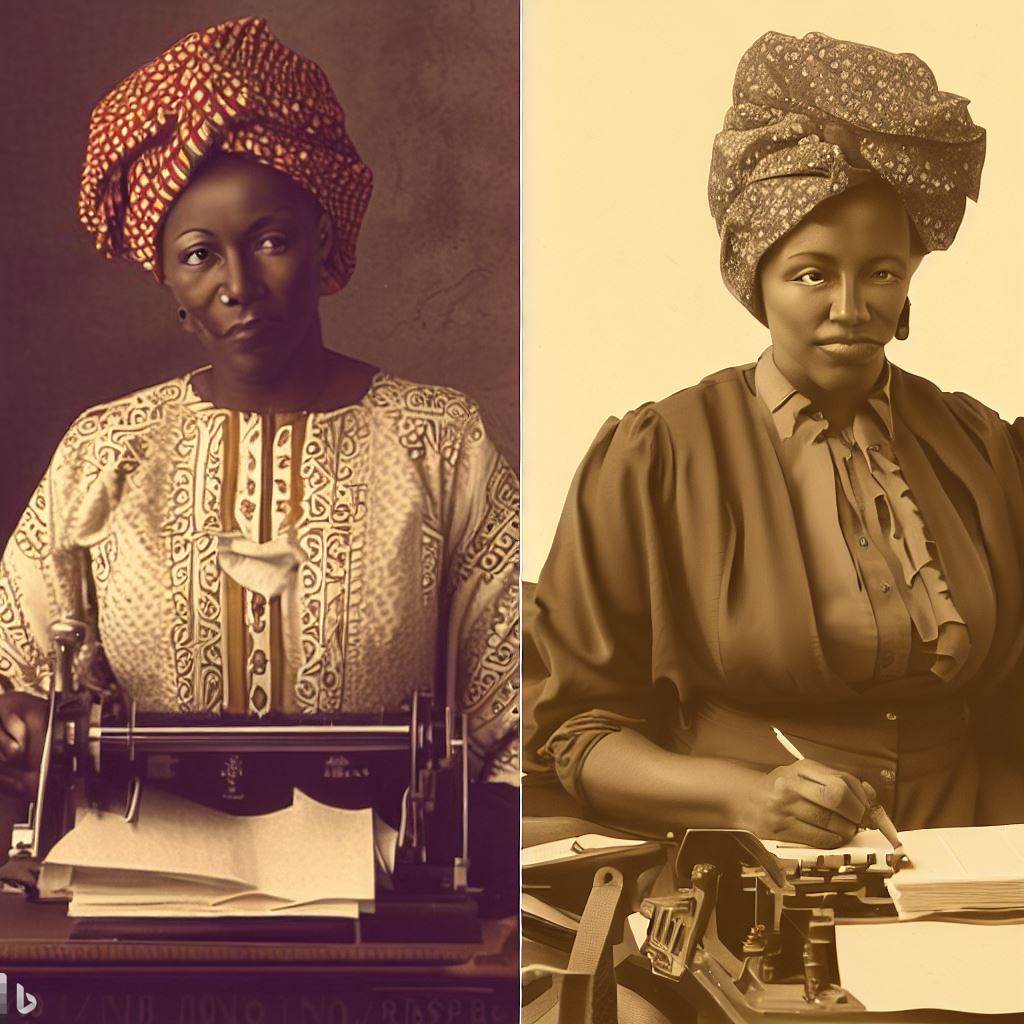Notable Nigerian Authors: Pioneers in Writing Profession
Last Updated on January 26, 2024
Introduction
Notable Nigerian authors have made significant contributions to the writing profession. Imagine stepping into a world where imagination and storytelling blend seamlessly, captivating readers.
Nigerian authors have played a crucial role in shaping the writing profession, showcasing the beauty and richness of their culture through literature.
Nigeria, a country rich in culture and history, has given birth to remarkable authors who have significantly impacted the world of literature. These authors, through their captivating storytelling and profound insights, have left an indelible mark on the writing profession. Delve into the world of these literary pioneers and discover the unparalleled contributions they have made.
A Captivating Hook
Imagine being transported to the vibrant streets of Lagos or the serene villages of Nigeria through the pages of a book.
The words come alive, painting vivid pictures of a world both familiar and foreign. This is the magic woven by the pens of Nigerian authors.
Thesis Statement
The literary landscape owes a debt of gratitude to Nigerian authors who have not only enriched our minds with their narratives but have also broken down barriers, shattered stereotypes, and elevated African voices.
These authors have demonstrated the significance of diversity and representation in the writing profession.
Authors Who Transcend Boundaries
- Chinua Achebe: His groundbreaking novel “Things Fall Apart” unveiled the complexities of pre-colonial Igbo society.
- Chimamanda Ngozi Adichie: With works like “Half of a Yellow Sun,” she intricately weaves tales of Nigeria’s history and resilience.
- Wole Soyinka: The first African Nobel laureate, his plays and poetry challenge societal norms with wit and depth.
Champions of Representation
- Buchi Emecheta: Through novels like “The Joys of Motherhood,” she tackled gender roles and the African diaspora.
- Teju Cole: A master of blending fiction and photography, his works provide insightful commentary on identity.
- Helon Habila: Known for “Waiting for an Angel,” his narratives delve into the lives of everyday Nigerians.
Nigerian authors have not only etched their names into the annals of literature but have also paved the way for a more inclusive and diverse writing landscape.
Their stories resonate far beyond borders, inspiring countless writers to embrace their unique perspectives.
As we celebrate these pioneers, let us recognize the invaluable importance of Nigerian authors in shaping the very essence of the writing profession.
Overview of Nigerian Literature
The emergence of Nigerian literature
Nigerian literature emerged during the colonial era when the country was under British rule.
It started with the publication of novels, poems, and short stories by Nigerian authors who were inspired by their experiences and the changing political landscape.
The first novel written by a Nigerian author, “Things Fall Apart” by Chinua Achebe, was published in 1958 and became a landmark in African literature.
The significance and influence of Nigerian authors worldwide
Nigerian authors have made significant contributions to world literature and have gained international recognition and acclaim.
Their works have not only entertained readers but have also shed light on the complex social, cultural, and political issues in Nigeria and Africa as a whole.
Nigerian authors, such as Chinua Achebe, Wole Soyinka, and Chimamanda Ngozi Adichie, have won numerous prestigious awards like the Nobel Prize in Literature and have been translated into multiple languages, making their works accessible to a global audience.
The different genres of literature prominent in Nigeria
1. Novels
Nigerian literature is rich in the genre of novels, which reflect the diverse experiences of Nigerians.
Novels like “Things Fall Apart,” “Half of a Yellow Sun,” and “Americanah” delve into themes such as colonialism, post-colonialism, identity, and cultural clashes.
2. Poetry
Poetry holds a special place in Nigerian literature, with poets like Christopher Okigbo and Gabriel Okara using powerful imagery and metaphors to explore love, politics, and society.
Nigerian poets often infuse their work with the beauty of their native languages, creating a unique blend of traditional and modern poetic expressions.
3. Drama
Nigeria has a vibrant tradition of dramatic literature, with playwrights like Wole Soyinka leading the way.
Nigerian dramas tackle social issues, political corruption, and offer insightful commentary on societal norms and values.
4. Short Stories
Nigerian authors have also excelled in the genre of short stories, crafting compelling narratives within limited word counts.
Authors like Chimamanda Ngozi Adichie have gained recognition for their ability to capture the complexities of Nigerian society in concise and impactful storytelling.
5. Non-fiction
Nigerian literature also encompasses non-fiction works, including memoirs, biographies, and essays.
These works provide valuable insights into historical events, the struggle for independence, and the challenges faced by Nigerians.
In the end, Nigerian literature has emerged as a significant force in the literary world, with its authors producing exceptional works across various genres.
The influence of Nigerian authors extends beyond their borders, with their works captivating readers worldwide and highlighting the unique experiences and perspectives of Nigerians.
Through their diverse genres, Nigerian authors contribute to the global literary landscape, enriching it with their unique voices and narratives.
Read: A Detailed Guide on the Nigerian Publishing Industry
Pioneering Nigerian Authors
Chinua Achebe
Chinua Achebe was born on November 16, 1930, in Ogidi, Nigeria. His most notable work is the novel “Things Fall Apart”, published in 1958.
Achebe’s impact on Nigerian and African literature is immense, as he is widely regarded as the father of modern African literature.
He introduced a new perspective to literature by portraying African culture, history, and experiences.
Achebe’s work challenged the prevailing colonial narratives and showcased the complexities of African identity.
He played a pivotal role in shaping post-colonial literature and inspiring generations of African writers.
Wole Soyinka
Wole Soyinka was born on July 13, 1934, in Abeokuta, Nigeria. One of his most notable works is the play “Death and the King’s Horseman”, written in 1975.
Soyinka’s contributions to Nigerian theatre and literature are remarkable. He played a vital role in establishing the first professional theatre company in Nigeria, the “Nineteen-Sixty Masks.”
Soyinka’s works often explore themes of power, politics, and the complexities of human existence. He became the first African writer to be awarded the Nobel Prize in Literature in 1986.
Buchi Emecheta
Buchi Emecheta was born on July 21, 1944, in Lagos, Nigeria. Her notable work includes the novel “The Joys of Motherhood”, published in 1979.
Emecheta played a significant role as a feminist writer in Nigeria. She explored themes of gender inequality, women’s rights, and the challenges faced by women in a patriarchal society.
Emecheta’s writing shed light on the experiences of Nigerian women and their struggle for autonomy and empowerment.
Her works challenged traditional gender roles and inspired a new generation of female Nigerian writers.
Read: How to Specialize in Technical Translation in Nigeria

See Related Content: Diversification Opportunities for Performers’ Agents in Nigeria
Contemporary Nigerian Authors
Chimamanda Ngozi Adichie
1. Brief Biography
Chimamanda Ngozi Adichie is a renowned Nigerian author born on September 15, 1977, in Enugu, Nigeria. She grew up in Nsukka, a university town, and later pursued her education in the United States.
Adichie holds a Bachelor’s degree in Communication and a Master’s degree in Creative Writing.
2. Notable Works
Adichie has produced remarkable works that have garnered international acclaim.
One of her notable novels is “Purple Hibiscus,” published in 2003. This debut novel explores themes of love, religion, and family dynamics set against the backdrop of political turmoil in Nigeria.
Another acclaimed work by Adichie is “Americanah,” published in 2013.
This novel delves into the experiences of a Nigerian woman living in the United States and addresses issues of race, identity, and romantic relationships.
3. Impact on Feminism and African Storytelling
Adichie has made a significant impact on feminism both within Nigeria and globally.
In her famous TED Talk titled “We Should All Be Feminists,” she eloquently discusses the importance of gender equality, challenging societal norms and advocating for feminism as a way to empower individuals.
Adichie’s writing often portrays strong female characters who defy societal expectations and confront gender-based discrimination.
Through her stories, she seeks to amplify the voices of women and promote a more inclusive and equal society.
Additionally, Adichie’s storytelling showcases the richness and diversity of African culture, shattering stereotypes and providing authentic representations of Nigerian life.
Helon Habila
1. Brief Biography
Helon Habila is a respected Nigerian author, born on November 1967 in Kaltungo, Nigeria.
He obtained a Bachelor’s degree in English Language and Literature from the University of Jos and later studied Creative Writing at the University of East Anglia in England.
2. Notable Works
One of Habila’s noteworthy works is the novel “Waiting for an Angel,” published in 2002.
Set in Nigeria during a military dictatorship, the book follows the life of a young aspiring writer and journalist navigating oppression and political corruption.
Habila skillfully weaves personal narratives with broader themes of social injustice. His writing exhibits a compelling blend of lyrical prose and political consciousness.
3. Exploration of Politics and Migration
Habila’s works often delve into the political landscape of Nigeria, shedding light on the socio-economic struggles faced by its citizens.
He explores themes of corruption, human rights abuses, and the impact of political unrest on individuals.
Additionally, Habila’s writings also touch upon the experiences of migration, reflecting on the challenges faced by Nigerians seeking better opportunities abroad.
Through his storytelling, he provides a nuanced understanding of the complex issues that shape Nigerian society.
Ayobami Adebayo
1. Brief Biography
Ayobami Adebayo is a talented Nigerian author born in Lagos.
She obtained a Bachelor’s degree in Literature in English from Obafemi Awolowo University and later completed a Master’s degree in Creative Writing at the University of East Anglia in England.
2. Notable Works
Adebayo gained critical recognition for her debut novel “Stay with Me,” published in 2017. The book explores themes of love, marriage, and fertility against the backdrop of Nigerian culture and traditions.
Adebayo’s storytelling captures the challenges faced by women in a society where motherhood is highly valued.
Her work delves into complex family dynamics and the cultural pressures that often affect relationships.
3. Contribution to Contemporary Nigerian Literature
Adebayo’s contribution to contemporary Nigerian literature lies in her ability to tackle sensitive and deeply ingrained societal issues with nuance and compassion.
Through her writing, she challenges traditional gender roles and explores the intricacies of human relationships.
Adebayo’s work resonates with readers around the world, representing the diverse narratives within Nigerian literature.
In a nutshell, Chimamanda Ngozi Adichie, Helon Habila, and Ayobami Adebayo are exemplary contemporary Nigerian authors who have made significant contributions to the literary world.
Their works tackle diverse themes, ranging from feminism and political issues to cultural traditions and societal expectations.
Through their storytelling, they have not only enriched Nigerian literature but also captivated global audiences, shedding light on the complexities of Nigerian society and showcasing the talent and creativity of Nigerian authors.
Read: Exploring the Journey to Becoming a Writer in Nigeria
The Influence of Nigerian Authors in the Writing Profession
Nigerian Authors Shaping the Literary Landscape
Nigerian authors have significantly contributed to shaping the literary landscape in Nigeria. Through their captivating storytelling, they have instilled a love for literature in countless individuals.
Nigerian authors have paved the way for aspiring writers, inspiring them to pursue careers in writing. They have challenged societal norms and pushed boundaries with their thought-provoking narratives.
Many Nigerian authors have captured the essence of Nigerian culture and traditions in their works. Their writings have become an integral part of the Nigerian identity, reflecting the nation’s diverse heritage.
Nigerian authors have explored various genres, including fiction, non-fiction, poetry, and drama. By doing so, they have expanded the literary options available to readers and fellow writers.
Their unique perspectives and storytelling techniques have brought a fresh and distinct voice to world literature.
Nigerian authors have also played a crucial role in preserving and promoting indigenous languages through their works.
Global Recognition and Awards Received by Nigerian Authors
- Nigerian authors have gained international fame and received numerous accolades for their exceptional writing.
- Many have been recognized with prestigious literary awards, such as the Nobel Prize in Literature and the Man Booker Prize.
- Chimamanda Ngozi Adichie’s novel “Half of a Yellow Sun” won the Orange Prize for Fiction in 2007.
- Wole Soyinka, a renowned Nigerian playwright and poet, became the first African recipient of the Nobel Prize in Literature in 1986.
- These global recognitions not only bring honor to the authors but also shed light on the rich literary tradition of Nigeria.
- Nigerian authors have entered the global literary Canon, their works studied in universities around the world.
- This recognition has opened doors for Nigerian authors, allowing their stories to reach a broader audience.
Socio-Political Impact of Nigerian Authors on Nigeria
- Nigerian authors have been at the forefront of addressing social and political issues through their works.
- By giving voice to the marginalized and shedding light on societal injustices, they have sparked conversations and ignited change.
- Chinua Achebe’s novel “Things Fall Apart” critically examines the impact of colonialism on Nigerian society.
- Through his writing, Achebe challenged the prevailing narrative imposed by the colonizers.
- Nigerian authors have also played a vital role in advocating for gender equality and women’s empowerment.
- The works of authors like Buchi Emecheta and Flora Nwapa have inspired generations of women to strive for independence and equality.
- Nigerian authors have used their platforms to advocate for good governance and the fight against corruption.
- Their writings have encouraged citizens to hold leaders accountable and work towards a better Nigeria.
- Nigerian authors have helped shape public opinion and influence government policies through their thought-provoking narratives.
- Their impact goes beyond the literary realm, contributing to the social and political fabric of Nigeria.
In general, Nigerian authors have significantly influenced the writing profession, shaping the literary landscape both locally and globally.
Their works have garnered international recognition and awards, elevating Nigerian literature to the world stage.
Additionally, their socio-political impact in Nigeria cannot be overlooked, as they have highlighted pressing issues and sparked important conversations.
Nigerian authors continue to inspire aspiring writers and provide a platform for diverse voices to be heard.
Read: Importance of Cultural Knowledge for Translators in Nigeria
Conclusion
Nigerian authors have played a crucial role in shaping the literary landscape, both within the country and globally. Their works have given voice to Nigerian culture, history, and experiences.
Readers are encouraged to explore the rich and diverse works of Nigerian authors.
From Chinua Achebe’s “Things Fall Apart” to Chimamanda Ngozi Adichie’s “Half of a Yellow Sun,” there is something for everyone to discover.
As Nigerian literature continues to evolve, it holds the potential to challenge norms, provoke thought, and ignite conversations.
The future of Nigerian literature is bright, with many emerging talents waiting to be heard.
Nigerian authors have left an indelible mark on the writing profession. Their contributions have not only enriched the literary world but also brought attention to the issues and realities faced by Nigerians.
It is vital that readers around the world appreciate and engage with the works of these notable authors.
By doing so, we can foster a deeper understanding of Nigerian culture and contribute to the ongoing growth and success of Nigerian literature.


